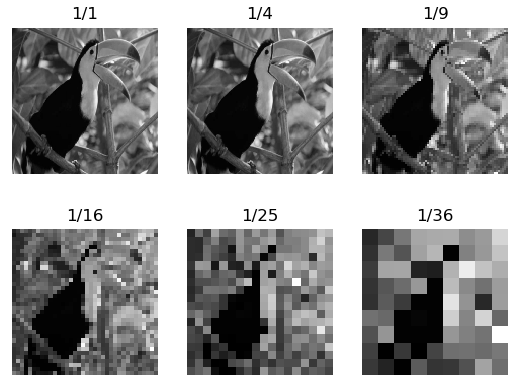import cv2import numpy as npimport matplotlib.pyplot as plt# Grayscaledef BGR2GRAY(img): # Grayscale gray = 0.2126 * img[..., 2] + 0.7152 * img[..., 1] + 0.0722 * img[..., 0] return gray# Bi-Linear interpolationdef bl_interpolate(img, ax=1.
import cv2
import numpy as np
import matplotlib.pyplot as plt
# Grayscale
def BGR2GRAY(img):
# Grayscale
gray = 0.2126 * img[..., 2] + 0.7152 * img[..., 1] + 0.0722 * img[..., 0]
return gray
# Bi-Linear interpolation
def bl_interpolate(img, ax=1., ay=1.):
if len(img.shape) > 2:
H, W, C = img.shape
else:
H, W = img.shape
C = 1
aH = int(ay * H)
aW = int(ax * W)
# get position of resized image
y = np.arange(aH).repeat(aW).reshape(aW, -1)
x = np.tile(np.arange(aW), (aH, 1))
# get position of original position
y = (y / ay)
x = (x / ax)
ix = np.floor(x).astype(np.int)
iy = np.floor(y).astype(np.int)
ix = np.minimum(ix, W-2)
iy = np.minimum(iy, H-2)
# get distance
dx = x - ix
dy = y - iy
if C > 1:
dx = np.repeat(np.expand_dims(dx, axis=-1), C, axis=-1)
dy = np.repeat(np.expand_dims(dy, axis=-1), C, axis=-1)
# interpolation
out = (1-dx) * (1-dy) * img[iy, ix] + dx * (1 - dy) * img[iy, ix+1] + (1 - dx) * dy * img[iy+1, ix] + dx * dy * img[iy+1, ix+1]
out = np.clip(out, 0, 255)
out = out.astype(np.uint8)
return out
# make image pyramid
def make_pyramid(gray):
# first element
pyramid = [gray]
# each scale
for i in range(1, 6):
# define scale
a = 2. ** i
# down scale
p = bl_interpolate(gray, ax=1./a, ay=1. / a)
# add pyramid list
pyramid.append(p)
return pyramid
# Read image
img = cv2.imread("../bird.png").astype(np.float)
gray = BGR2GRAY(img)
# pyramid
pyramid = make_pyramid(gray)
for i in range(6):
cv2.imwrite("out_{}.jpg".format(2**i), pyramid[i].astype(np.uint8))
plt.subplot(2, 3, i+1)
plt.title('1/' + str((i+1)**2) )
plt.imshow(pyramid[i], cmap='gray')
plt.axis('off')
plt.xticks(color="None")
plt.yticks(color="None")
plt.show()


以上就是python实现图像高斯金字塔的示例代码的详细内容,更多关于python 图像高斯金字塔的资料请关注易盾网络其它相关文章!
